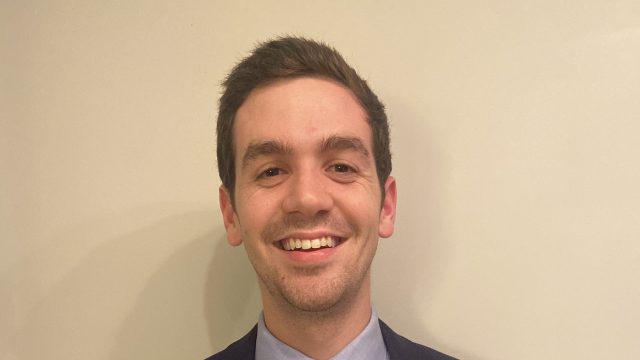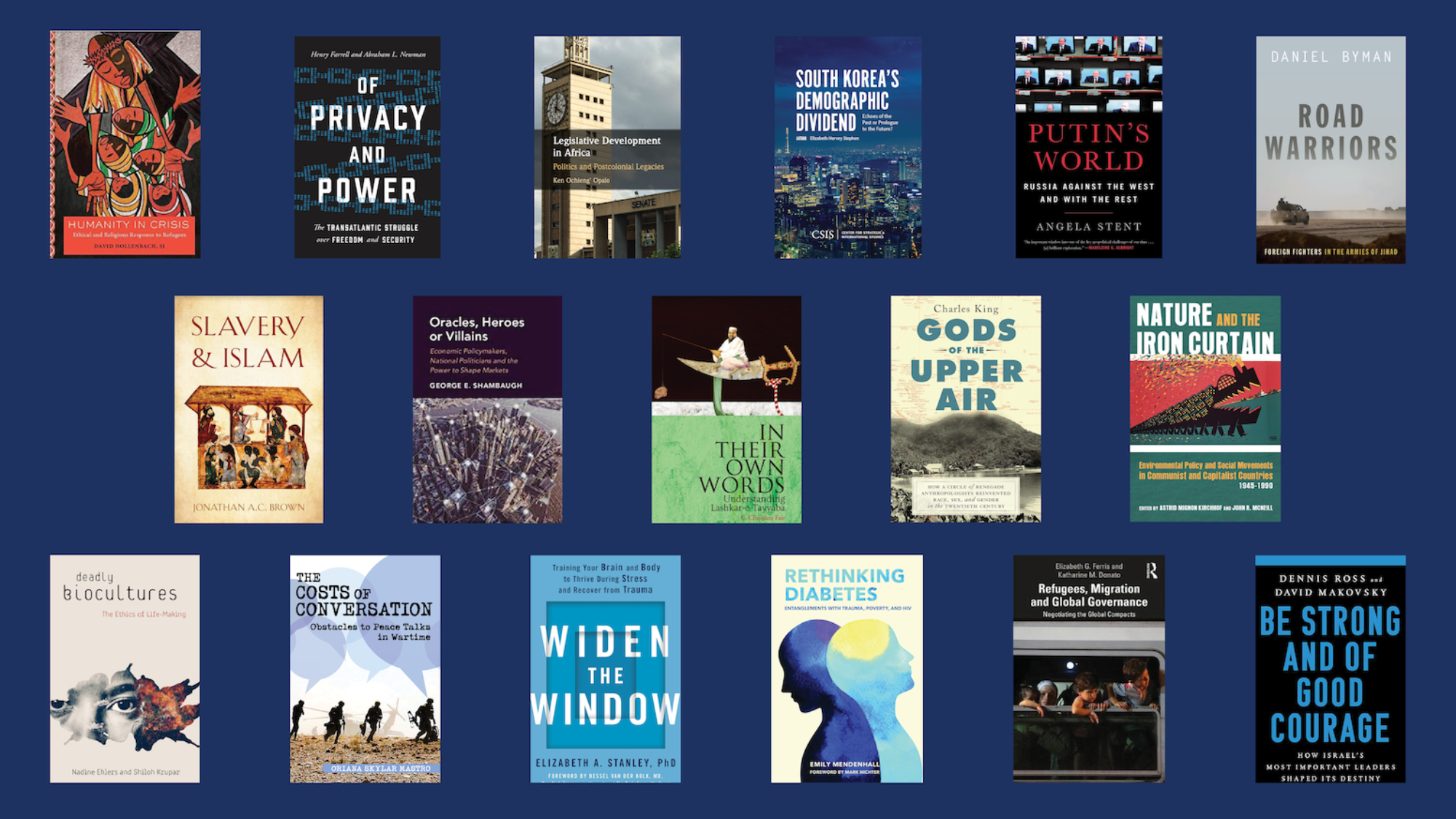
Title: SFS Professors Publish to Critical Acclaim
In the last year, SFS faculty have made many notable contributions to the published scholarship in their respective fields, through the release of books that have garnered glowing publicity in national media. Other professors look forward to the upcoming release dates of their works. The scholastic output of SFS professors continues to push the boundaries of research, unveil practical solutions to seemingly intractable problems, and tackle issues of increasing global salience.
Slavery and Islam – Jonathan A.C. Brown

In August, Jonathan A.C. Brown, Associate Professor and Prince Alwaleed bin Talal Chair of Islamic Civilization, released his book, Slavery and Islam, which examines the moral and theological issue of slavery, noting the contradiction between the practice’s universal vilification today and the fact that all major religions and schools of philosophy once condoned the practice.
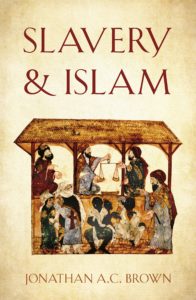
Brown’s study tries to draw out the attempts by followers of Islam, Judaism, Christianity to rectify the modern moral certainty concerning slavery with the supposed words of God that formerly permitted the buying and selling of human beings as cattle. Brown delves into the history of how slavery was practiced and promulgated throughout the Islamic world, before analyzing various legal arguments for abolition put forward by Muslim scholars.
An article in The Economist, “Everywhere in Chains: Why Islamic Debates over Slavery Matter to Everyone,” written for the Erasmus project on the interplay between religion and policy, uses Brown’s book to make the case that theology matters in the world today. In a discussion of Daesh or ISIS’ justification of rape and enslavement of adversarial populations, the article notes, “any argument that can be constructed theologically can also be deconstructed.”
Road Warriors: Foreign Fighters in the Armies of Jihad – Daniel Byman

In his new book released in June 2019, Road Warriors: Foreign Fighters in the Armies of Jihad, Daniel Byman, Professor in the Security Studies Program and Vice Dean for Undergraduate Affairs, traces the origins and development of the practice of traveling to warzones to join violent Islamist organizations. Byman weaves together a number of examples of Jihadi volunteerism: to places such as Iraq and Syria, Chechnya, Bosnia, and Afghanistan in the 1980s. Describing profiles of individual fighters, Byman outlines the conditions in which they leave home to fight for extremist causes.
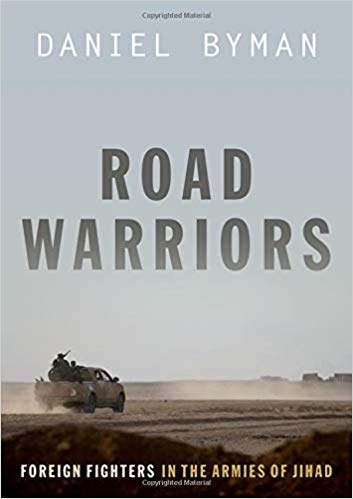
He notes differences between volunteer fighters from Arab countries and those from the West, who reportedly often prove to be greater liabilities than assets for the movement they have joined. In his book Byman describes the life trajectories of jihadi fighters: some make the practice a lifelong pursuit, while others return home after their stint fighting, either to become deadly terrorists or to retreat into a life of relative normalcy.
Byman asserts that foreign fighters present a credible threat to global security, but also describes the methods by which states have reduced their numbers, minimized the allure of conflict, and learnt to track and apprehend potential fighters who travel to jihadi “hotspots” around the world.
Byman was interviewed by the Lawfare Podcast about his book.
Deadly Biocultures: The Ethics of Life-Making – Nadine Ehlers and Shiloh Krupar

Shiloh Krupar, Provost’s Distinguished Associate Professor and the Field Chair of the Culture & Politics Program, along with Nadine Ehlers (non-GU affiliated) are preparing for the publication of Deadly Biocultures: The Ethics of Life-Making, which examines the inextricable association between efforts at “making live” and economic capital. The release is scheduled for December 2019. Krupar and Ehlers illustrate how “the affirmation to hope, target, thrive, secure, and green in the respective biocultures of cancer, race-based health, fatness, aging, and the afterlife” must be understood in terms of “inequitable distributions of life based on race, class, gender, and dis/ability.” They note that medical decisions are increasingly made “beyond the formal institutions of the hospital, clinic, and lab;” people live their lives in accordance with “health directives” and “increasingly neoliberal forms of medical administration.” They argue that a byproduct of this shift is likely to be an obscuring of death and even the creation of “deadly conditions.”
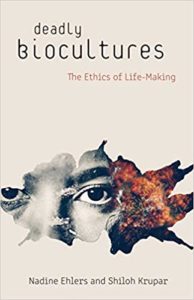
The example of “medical hotspotting,” a recent development in medical administration designed to customize care and produce “socially-oriented health care delivery to the home,” serves to prove their point. The practice has created the category of healthcare “super-users,” who are understood as drains on the system, and may lead to “medical redlining – that is, delineating ‘problem spaces’ with ‘problem people’ in new medical jurisdictions.” Although medical hotspotting literature avoids the category of race, the practice advances “an imagination of deserving (white) insurance-paying, middle-class Americans against those who cannot afford it and should be dealt with separately, as healthcare threats and high risk pools.”
In this incisive analytic text, Krupar and Ehlers question whether alternative societal and individual practices can be enacted in the biomedical sphere to erase the inequities they describe.
In their Own Words: Understanding Lashkar-e-Tayaba – Christine Fair

In light of recent actions by the Indian government in the disputed region of Kashmir, Christine Fair, a Provost’s Distinguished Associate Professor in the Security Studies Program, has received renewed attention for her 2018 book In Their Own Words: Understanding Lashkar-e-Tayaba, which was republished in the United States in January 2019 by Oxford University Press.
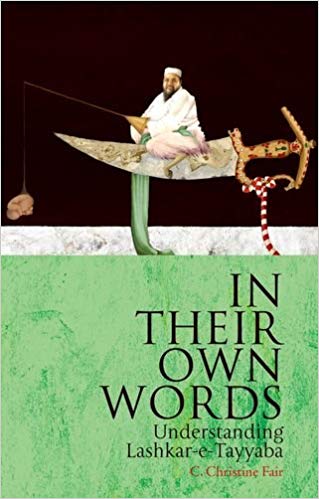
In the book, Fair explains the role that the terrorist organization Lashkar-e-Tayaba (LeT) plays in Pakistan, attempting to elucidate how the group maintains support despite mounting international pressure against it. The Financial Times listed the work in an article “Five Books that Explain Kashmir’s Decades-Long Crisis,” which described it as a “tour de force” in the way it analyses the the terror group’s published propaganda and attempts to challenge India’s sovereignty over Kashmir.
The move to revoke the autonomy of Kashmir by India’s ruling BJP party is not surprising. Indeed, it has long been a manifesto line-item for the party. Fair notes that her book doesn’t directly relate to this issue but provides context and color to the big picture of the decades old Kashmir Conflict. What’s key to understand, she stresses, is that LeT is not an independent actor, but a tool of the Pakistani government used to attack Indian targets without overtly doing so themselves. “As long as Pakistan wants to change the map, they will use LeT [and similar groups] as proxies,” she clarifies. India’s recent power-play in Kashmir will only strengthen this tendency of the Pakistani government.
Of Privacy and Power: The Transatlantic Struggle over Freedom and Security – Henry Farrell and Abraham L. Newman
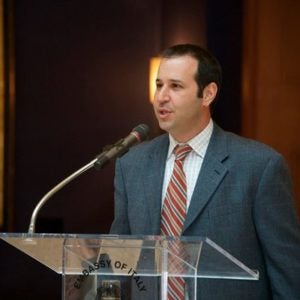
In the highly globalized world of international terrorism, e-commerce, and cross-border data networks, Abraham Newman, Professor of Foreign Service and Government and Director of the Mortara Center for International Studies, and Henry Farrell (non-GU affiliated) tackle how these new phenomena are shaping the regulation of privacy and security as part of the Transatlantic relationship between the United States and the European Union.
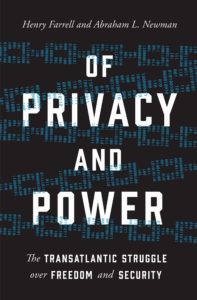
Their book, Of Privacy and Power: The Transatlantic Struggle over Freedom and Security, which was released in April 2019, delves into how these developments of the modern world have led to clashing of states’ jurisdictions and negotiations over security and privacy.
Newman and Farrell push back against the characterization of the transatlantic relationship over questions of security as a clash between peace loving Europe and hawkish America. Through the analysis of three security debates in the period since 9/11, involving Passenger Name Record data, the SWIFT financial messaging controversy, and Edward Snowden’s revelations, the authors present a new paradigm of a relationship, which pits two transnational coalitions against each other: one that favors security, the other liberty.
Refugees, Migration and Global Governance: Negotiating the Global Compacts – Elizabeth G. Ferris and Katharine Donato
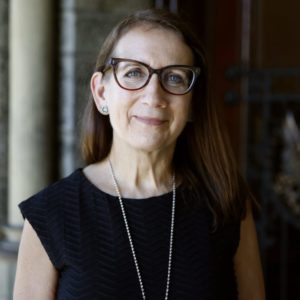
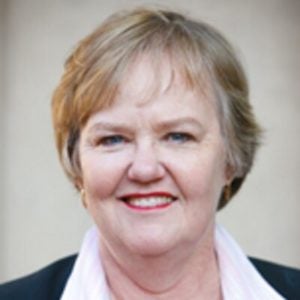
In July 2019, Elizabeth Ferris, Research Professor in the Institute for the Study of International Migration (ISIM), and Katharine Donato, Director of ISIM and the Donald G. Herzberg Professor of International Migration, published Refugees, Migration and Global Governance: Negotiating the Global Compacts, a firsthand telling of how migration is being addressed at the highest levels of global governance.
The international framework for dealing with migrants and refugees changed in 2016, when 193 members of the United Nations unanimously adopted the New York Declaration on Refugees and Migrants, which led to the 2018 Global Compact for Migration. This agreement, they explain, is “the first-ever effort to develop a comprehensive framework on migration and offers a world of possibilities to improve current practice.”

The Compact balances both the wellbeing of migrants and the concerns of governments about border security. Although the outlook is positive, Ferris and Donato note that the Compact’s effectiveness relies on how readily nations implement its provisions to work towards its 23 objectives. Their new book, which is the first published on the Compacts, provides a road-map to understanding this landmark agreement on migration and how it was negotiated and developed. While writing this book, the authors benefited from the increased visibility that migrant groups have achieved since the New York Declaration and the corresponding “outpouring” of scholarship and activism that they characterize as a “creative flowering of new ideas about how to improve the treatment of refugees and migrants.” As a result, Donato and Ferris were able to look beyond the current state of affairs to probe into theoretical ways for the global community to manage safe and regular migration that drives the global economy, and to respond to increasing numbers of irregular migrants and refugees.
Humanity in Crisis: Ethical and Religious Responses to Refugees – David Hollenbach
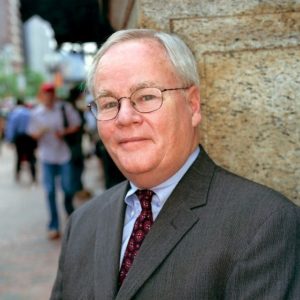
David Hollenbach, S.J., the Pedro Arrupe Distinguished Research Professor in the SFS; senior fellow at the Berkley Center for Religion, Peace, and World Affairs; and affiliated professor in the Department of Theology and Religious Studies, will publish Humanity in Crisis: Ethical and Religious Responses to Refugees in December 2019. The book winds its way through the major humanitarian crises of the last 50 years—including the Rwandan genocide, the killing fields of Cambodia, and current conflicts in Syria and South Sudan—to examine their political and economic dimensions and highlight key moral issues for policymakers, humanitarians, and faith communities.
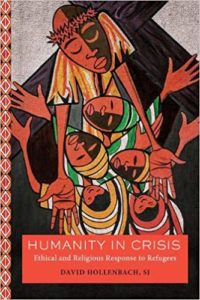
The book draws on the ethical and religious momentum of the last 150 years to ask profound and incisive questions like “Why do humanitarian crises keep happening?” and “How can we stop them?” Rev. Hollenbach has asked such questions over the course of a prestigious academic timeline: in his time at Georgetown, and previously at Boston College, he has published and taught extensively on matters such as human rights, ethical crises, and religion in political life. Humanity in Crisis represents another scholastic milestone in a career marked by the influences of Catholic social thought and social scientific discipline.
Though Georgetown University Press will not publish Humanity in Crisis until December, it has already received advance praise. According to Donald Kerwin, Executive Director of the Center for Migration Studies of New York, the book provides “a powerful framework for responding to the complex, large-scale humanitarian crises that have forcibly displaced record numbers of human beings.” In a moment when many developed states have stepped back from their responsibility to refugees, Hollenbach offers solace and solutions. “Ultimately, this is a hopeful book,” Kerwin says.
Gods of the Upper Air: How a Circle of Renegade Anthropologists Reinvented Race, Sex, and Gender in the Twentieth Century – Charles King
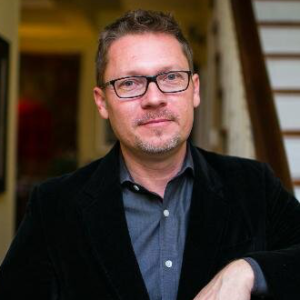
Charles King, Professor of International Affairs and Government and Chair of the College’s Government Department, released Gods of the Upper Air in August 2019. The book is a study of the birth of cultural anthropology around the turn of the 20th century, its founder Franz Boas, and his acolytes, who, King claims, initiated a revolution in the understanding of identity in the modern era. Boas was a German-born immigrant to the United States who challenged the prevailing science of eugenics of his era to emphatically prove the non-existence of any innate racial hierarchy. The United States’ immigration policies of racial quotas and the near ubiquitous practice of segregation illustrate the enormity of what Boas was up against in his efforts to show that race could not be used to explain differences in intelligence, criminality or other traits. Boas’ ideas were considered so polemical and dangerous that the FBI opened a file on him, and Columbia University, where he was a professor, cut funding to his research. The iconoclast anthropologist lived long enough to see his theories scorned and spurned in his native land by Hitler and the Nazis; however, he successfully inspired a diverse group of his students to carry forth the torch of reason and tolerance.
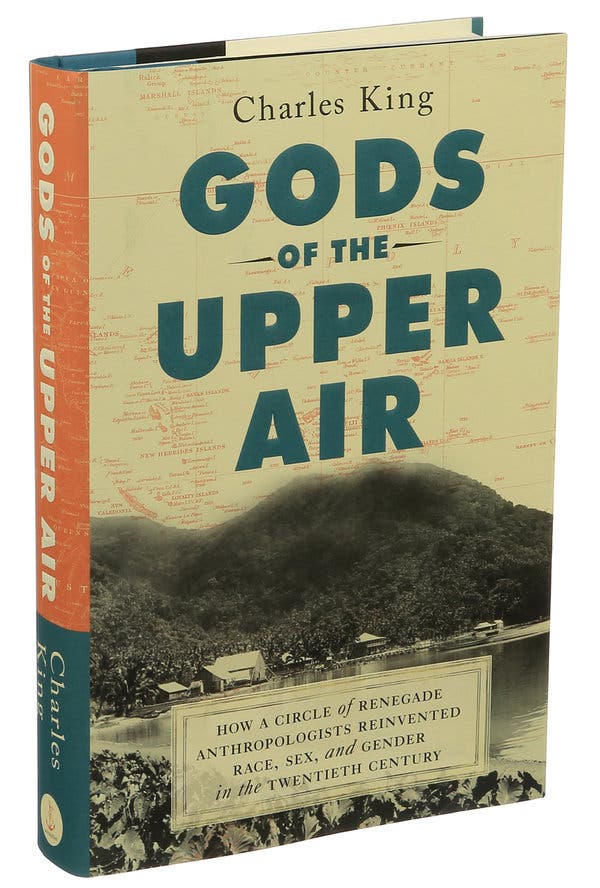
King dubs Boas’ students “a circle of renegade anthropologists,” as they pioneered their teacher’s anthropological methods, challenging received wisdom, everywhere they went: from the American South to the shores of Samoa. Of Boas’s mentees, some went on to become celebrated intellectuals: Margaret Mead represented a key figure in the sexual revolution of the 1960s; and Zora Neale Hurston’s name is essential to an understanding of the black struggle in 20th century America. Others are less well known, but similarly influential, King claims, in their efforts to shift the arc of American history towards justice. Ruth Benedict became a giant in the field of anthropology in her own right, a remarkable feat for a woman in those times. She is recognized particularly for her work on Japan following World War II. Finally, Ella Cara Deloria, who was born on the Yankton Indian Reservation in South Dakota, used the skills and techniques she learnt from Boas to study her own community, recording Native American languages of the Great Plains and organizing for better conditions.
With an interview on NPR’s Fresh Air, a write up in both The Washington Post and The New Yorker, and glowing reviews in The Wall Street Journal, The New York Times, and USA Today, King’s Gods of the Upper Air is receiving its fair share of publicity. As of August 28, the book had earned a place on the New York Times Best Seller list.
Nature and the Iron Curtain: Environmental Policy and Social Movements in Communist and Capitalist Countries, 1945-1990 – Astrid Mignon Kirchhof and John R. McNeill

John R. McNeill, University Professor, and Astrid Mignon Kirchhof, a former Postdoctoral Fellow in the Center for German and European Studies, released Nature and the Iron Curtain: Environmental Policy and Social Movements in Communist and Capitalist Countries, 1945-1990, in March 2019, to great critical acclaim. This political and comparative history of environmentalism on both sides of the Iron Curtain draws from archives across Europe and the United States to masterfully thread together the divergent and convergent stories of modern environmental policy and the activism that occurred to achieve it.

This broad collection, brought together by editors Kirchoff and McNeill, assembles numerous perspectives on diverse issues that range from the “Fallout of Chernobyl” to the “Environmental Policy in Socialist Yugoslavia.”
Marco Armiero, Director of the Environmental Humanities Laboratory, KTH Royal Institute of Technology, Stockholm, praised the work: “At the edge of yet another apocalypse, in the midst of wars, political turbulence, and ecological crisis, Astrid Mignon Kirchhof and J.R. McNeill bring us back to another time of great anxiety for the future of the planet… The result is a unique history book which offers original insights into the Cold War but, hopefully, it will also tell us something about our (possible) futures.”
The Costs of Conversation: Obstacles to Peace in Wartime – Oriana Skylar Mastro

In her latest book, released March, 2019, The Costs of Conversation: Obstacles to Peace in Wartime, Oriana Skylar Mastro, Assistant Professor of Security Studies, games out the decisions made by combatant parties when they judge whether to talk to their enemy. She attempts to create a map that illustrates how a conflict evolves from a state of exclusively fighting to a position in which negotiations are also viable. In this endeavor, Mastro identifies two key factors that leaders in conflict consider when judging the strategic cost of initiating talks with their opposition: whether the enemy will consider overtures to negotiation as a sign of weakness, and how the enemy will alter strategy after moves toward compromise are made.

By analyzing the processes and outcomes of four state actors in three conflicts, China in the Korean and Sino-Indian Wars, India in the latter conflict, and North Vietnam in the Vietnam War, Mastro notes that leaders only come to the negotiation table if they conclude that they have demonstrated suitable strength and resiliency and that their enemy is unlikely to further escalate, intensify or prolong the conflict.
An understanding of how conflicts are likely to end has practical and theoretical advantages for military strategists, diplomats, and peacebuilders.
Rethinking Diabetes: Entanglements with Trauma, Poverty, and HIV – Emily Mendenhall
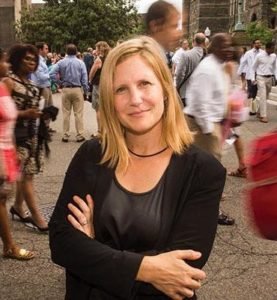
Emily Mendenhall, Provost’s Distinguished Associate Professor in the STIA Department, released a comprehensive study of syndemics, Rethinking Diabetes: Entanglements with Trauma, Poverty, and HIV in July 2019. A syndemic is a conceptual framework that looks at how “two or more diseases cluster in a population and then interact.” The interactions can be biological, bio-behavioral, psychological, or social in nature. In her groundbreaking book, Mendenhall examines how political, economic, social, and ecological factors initiate and exacerbate disease interactions among the poorest and most vulnerable populations of the world.
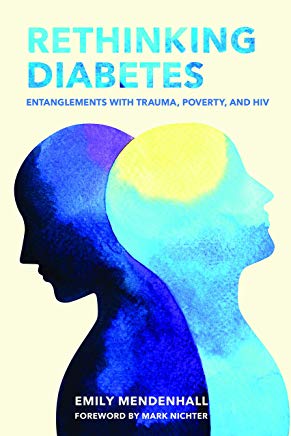
Mendenhall’s most recent publication, which is the result of 15 years of research in Chicago, India, South Africa, and Kenya, challenges the received wisdom on diabetes that asserts that the disease is affected by the same socio-economic transitions everywhere. Mendenhall throws out the conception of diabetes as simply a product of lifestyle choices that lead to obesity. Instead, she posits that the disease is a “reflection of society” and to use the model of causative obesity for the disease in lower income countries is to misappropriate blame and shame onto the victims of structural poverty for the effects of social change: “how we move and live and think and see and interact and love and feed in the world… has changed so rapidly in 50 years. And that is changing in every society very differently.”
Legislative Development in Africa: Politics and Post-Colonial Legacies – Ken Opalo

The first book of Ken Opalo, Assistant Professor with the School of Foreign Service, Legislative Development in Africa: Politics and Post-Colonial Legacies, was also released. The work examines the autocratic origins of democratic institutions in Africa, pushing back on the image of African legislatures in the popular press and academic works as generally weak, passive, and largely irrelevant for political and policy outcomes. He explains that African governments have been blighted by the perception of presidents as “omnipotent” managers of “personalist dictatorships.” Despite this, Opalo finds that African legislatures continued to play pivotal roles in the era of decolonization and after “as important arenas of organizing intra-elite politics and sharing of power and access to state resources.” He notes that states with longer traditions of legislatures at independence experienced fewer coups and less political violence.
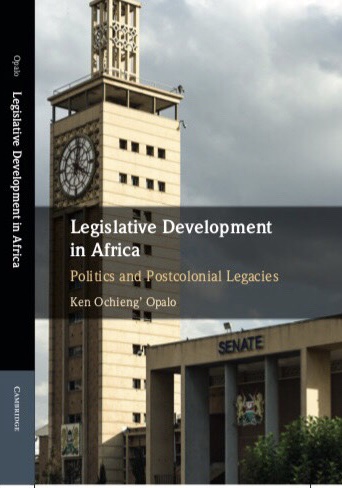
Opalo tracks the progress and development of African legislatures through to the emergence of multipartyism is in the 1990s up until even more recent times, when legislatures played a key role in the protection of term limits. To his quantitative overview, Opalo adds detailed case studies of the Kenyan and Zambian lawmaking bodies. These were picked as two former British colonies, which share in the Westminster tradition of parliamentarianism but have experienced significant divergence from each other since independence. While Zambia’s parliament remains relatively weak, its Kenyan counterpart has developed a certain strength.
With his book, Opalo hopes to demonstrate how popular and academic focus on infrequent presidential elections in Africa is inadequate: “what happens in-between elections often has a bigger bearing on outcomes… Legislatures help keep presidents in check between elections. Understanding how legislatures work in young postcolonial democracies is therefore important, whether one is interested in policy or governance outcomes in these contexts.”
Be Strong and of Good Courage: How Israel’s Most Important Leaders Shaped Its Destiny – Dennis Ross and David Makovsky

Ambassador Dennis Ross, Distinguished Professor of the Practice of Diplomacy, released his book, Be Strong and of Good Courage: How Israel’s Most Important Leaders Shaped Its Destiny to widespread acclaim in September 2019. Co-authored with David Makovsky (not Georgetown-affiliated) of the Washington Institute for Near East Policy, the book details the founding generation of Israeli leadership: David Ben-Gurion, Menachem Begin, Yitzhak Rabin, and Ariel Sharon.
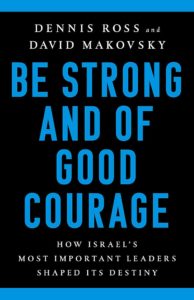
Published by the Hachette Book Group, the book aims to profile the first leaders of Israel in all their moral, religious, and political commitments, as well as in their shortcomings. Ambassador Ross and Makovsky are devoted to Israeli-Palestinian peace and offer the stories of Ben-Gurion, Begin, Rabin, and Sharon as instruction for current Israeli leadership. Be Strong and of Good Faith is an appeal to the nation’s founding principles, ones its authors worry are being superseded by personal and political interests.
Since its publication, the book has been praised by numerous, highly-regarded sources. According to Former Secretary of State Hillary Clinton, “It is a story that can provide guidance for today’s leaders in Israel and for all of us on the meaning of leadership.” Former Secretary of State Henry Kissinger calls it “a powerful statement,” and Kirkus Reviews has declared that it offers “solid historical guidance for policymakers and students of the Israeli-Palestinian conundrum.”
Oracles, Heroes or Villains: Economic Policymakers, National Politicians and the Power to Shape Markets – George Shambaugh
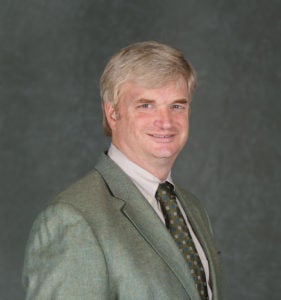
George Shambaugh, Associate Professor of International Affairs and Government, is awaiting the publication of his most recent book, Oracles, Heroes or Villains: Economic Policymakers, National Politicians and the Power to Shape Markets, which is scheduled for October 2019. Shambaugh’s work could not be timelier. As he seeks to discern a place for technocratic economists in the global economy and political system, the news has focused on President Trump’s criticism of Fed Chair Jerome Powell, which has been interpreted as an attack on the central bank’s independence. Shambaugh, however, argues that the independence of central bankers is misconstrued.
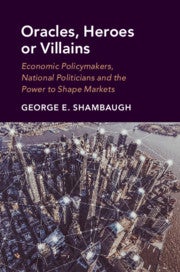
The best economic technocrats, he asserts, are all “inherently politicians.” They have to “read the political environment” and know when to “compensate for political and policy uncertainty.” In order to shape market expectations about what the government is likely to do and what impacts its chosen policy is likely to have, central bankers must command the right blend of authority, deference, and legislative capacity, “to bolster as well as constrain national politicians and to reinforce or challenge legislation when necessary.” Shambaugh expressed optimism at the appointment of Christine Lagarde, who is not a trained economist, to the head position at the European Central Bank, noting her political savviness.
Shambaugh makes clear that central bankers ought not to be “political sycophants,” but neither should national politicians always delegate authority over economic policy to technocrats. The problem, he explains, is when a crisis situation, such as in 2008, paralyzes the political actors leaving them “unwilling or unable” to take action. At that time central bankers, from the Federal Reserve to the European Central Bank, stepped in to save the day. While remarkably successful, monetary policy is a blunt instrument and the benefits of their interventions were not distributed evenly within society. Consequently, certain central bankers who were formerly considered oracles and heroes have been condemned by some as villains. Addressing the remaining inequities requires legislation. Indeed, the principal lesson of the most recent financial crisis is that optimal economic policy requires national politicians and politically astute economic technocrats to work together, “reinforcing and checking each other when necessary.”
Widen the Window: Training Your Brain and Body to Thrive During Stress and Recover from Trauma – Elizabeth Stanley

Elizabeth Stanley, Associate Professor in the Security Studies Program, explores the neurobiology of stress, trauma, and resilience in the September 2019 release of Widen the Window. While stress and trauma have conventionally been thought of as distinct, Stanley analyzes them as part of a continuum, explaining why an event that’s stressful for one person can traumatizing for another. She also examines the cultural norms that impede resilience in America, especially our collective tendency to disconnect stress from its consequences and override our need to recover.

Drawing on stories from her own life and from the men and women she’s trained, she explores how recovery and resilience can be learned. In writing this book, she incorporated expertise she gained in developing Mindfulness-based Mind Fitness Training (MMFT)®, tested through four Department of Defense neuroscience studies with the U.S. military. She has employed this training with thousands in high-stress environments: troops preparing for combat, inmates at a maximum-security prison, health-care providers, executives in the corporate world, and members of Congress.
Tim Ryan, Congressman (D-OH), 2020 presidential candidate and author of Healing America, praises Stanley, describing her book as a “must-read for everyone who cares about our future.” Chuck Hagel, 24th Secretary of Defense, refers to it as “an exceptional book of understanding, relating to and controlling stress and trauma.”
South Korea’s Demographic Dividend: Echoes of the Past or Prologue to the Future? – Elizabeth Hervey Stephen

In February 2019, Elizabeth Hervey Stephen, Associate Professor of Demography and a CNDLS Senior Scholar, released her book, South Korea’s Demographic Dividend, which depicts the social and demographic outcomes of South Korea’s economic miracle.

Stephen examines how social change has resulted in low fertility and mortality rates, which have produced a window of time called the Demographic Dividend, in which the working-age population is large with a correspondingly small number of dependents (children and the elderly).
Stephen observes how continued extremely low fertility threatens the centuries old Confucian contract that parents will look after children with the expectation that the children will return the favor later in life, since there are so few children to take care of their elderly parents. South Korea has benefited from a productive working-age cohort with a high savings rate. However, now the country must prepare for the advancing demographic cliff, when the number of retirees can no longer be supported by a less numerous working population. Serious trends are already being observed such as the elderly South Koreans having the highest suicide rate in the world.
Putin’s World: Russia Against the West and with the Rest – Angela Stent
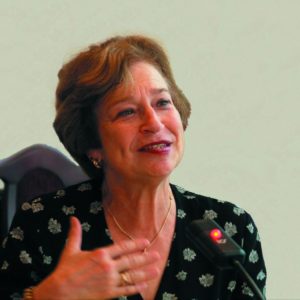
Angela Stent, Director of the Center for Eurasian, Russian and East European Studies and Professor of Government and Foreign Service, released her book Putin’s World: Russia Against the West and with the Rest in February 2019 to widespread critical acclaim. The book examines Russia’s rise under Putin from the ruins of the immediate post-Soviet era to reasserting its role on the world stage. Stent also looks into how Putin has played a weak hand well, including Russia’s growing standing in the Middle East, its new partnership with China, and increasing rivalry with the United States.
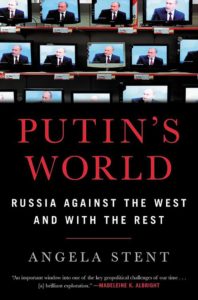
Stent’s book is based on both her academic work and her time in the State Department’s Office of Policy Planning and at the National Intelligence Council in the mid-2000s, when she and her colleagues frequently discussed the specter of Russia as a geopolitical challenge. However, with hindsight, she recognizes that they vastly underestimated the country’s ability to bounce back from the chaos of the 1990s and were wrong to assume “that post-Soviet Russia would want to be like the West.” Russian history, Stent says, illustrates the continuities in Moscow’s foreign policy.
Putin’s World was reviewed in The Washington Post and The Financial Times.
